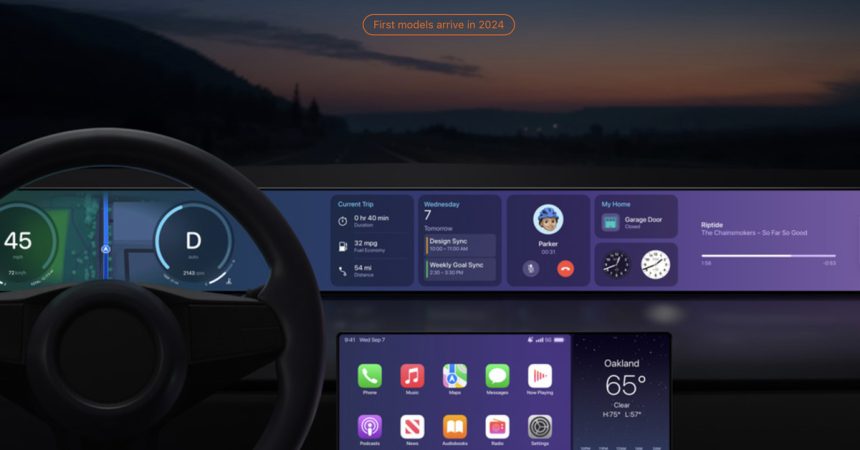Apple’s ambitious “next generation of CarPlay,” initially unveiled in 2022 with a projected 2024 rollout, continues to be shrouded in mystery. The revolutionary software, designed to seamlessly integrate with a vehicle’s entire dashboard, including the instrument cluster, climate controls, and entertainment system, has yet to materialize in any production car. Despite Apple’s continued assurances on its website, skepticism mounts regarding its actual arrival in 2024, especially given the lack of concrete updates and the conspicuous absence of any compatible vehicles.
While some limited CarPlay features, like navigation integration within the instrument cluster, have trickled into select car models from Polestar, Porsche, and Lincoln, these represent incremental advancements rather than the full realization of Apple’s envisioned CarPlay overhaul. Even vehicles like the 2024 Lincoln Nautilus, boasting ample screen real estate ideally suited for the new CarPlay experience, have not incorporated the comprehensive software integration Apple promised. This raises questions about the feasibility and timeline of the project, further fueled by the reticence of car manufacturers like Porsche and Aston Martin, who initially championed the new CarPlay but now remain silent on its implementation.
The lack of clarity surrounding the next-generation CarPlay is exacerbated by the resistance from major automakers like General Motors and Rivian. These companies have publicly expressed their reluctance to cede control of their in-car systems to Apple or Google’s Android Auto, preferring to develop their own proprietary software solutions. This resistance, particularly from a market leader like GM, poses a significant challenge to Apple’s ambitions for CarPlay dominance. It highlights the inherent tension between tech giants eager to extend their ecosystem into vehicles and car manufacturers determined to maintain control over the user experience and potentially lucrative data streams.
Apple’s continued pronouncements regarding the future of CarPlay, despite the setbacks and resistance, suggest a persistent commitment to its vision. However, the absence of concrete demonstrations and the growing list of automakers opting for alternative strategies paint a less optimistic picture. The original roadmap, showcasing a wide array of car brands embracing the next-generation CarPlay, now appears increasingly unrealistic. It remains to be seen how Apple will navigate these challenges and whether the full potential of its reimagined CarPlay will ever be realized.
The delay and uncertainty surrounding the next generation of CarPlay underscore the complex interplay between the tech and automotive industries. While Apple enjoys considerable influence in the consumer electronics space, the automotive sector presents unique challenges. Car manufacturers are protective of their brand identity and wary of relinquishing control over critical aspects of the driving experience. They also face longer development cycles and stricter safety regulations, complicating the integration of rapidly evolving software like CarPlay.
Ultimately, the fate of Apple’s next-generation CarPlay hinges on its ability to convince car manufacturers of its value proposition. This requires not only demonstrating a compelling user experience but also addressing concerns about data privacy, control, and revenue sharing. If Apple can successfully navigate these complex negotiations and deliver on its promises, CarPlay could reshape the in-car experience. However, should the current trend of delays and resistance persist, the ambitious project may ultimately be scaled back or indefinitely postponed, leaving Apple’s vision for the future of in-car infotainment unfulfilled.



